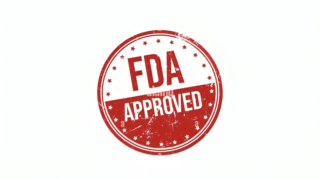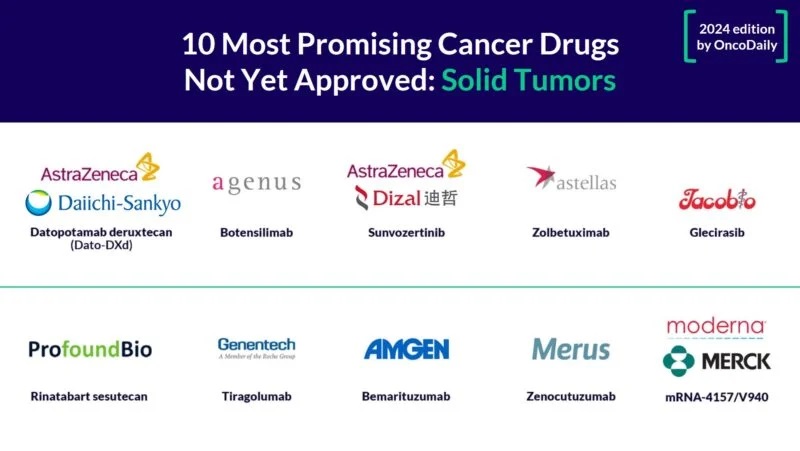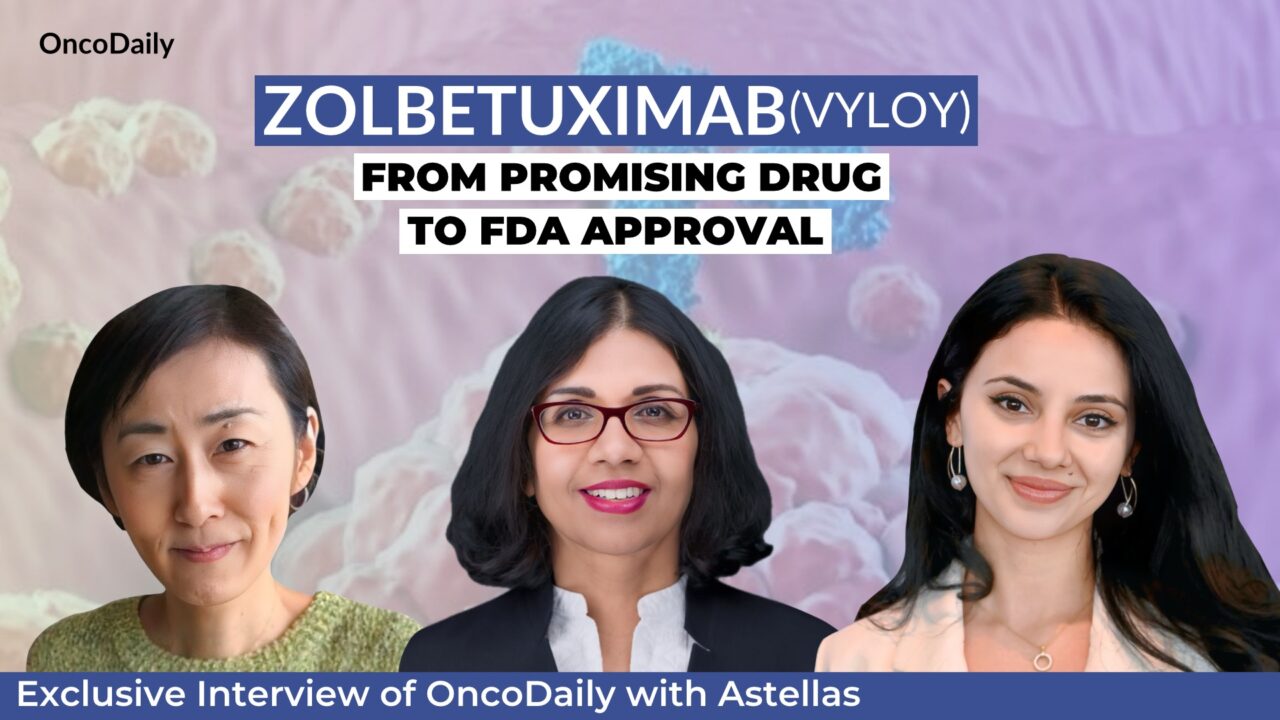In this episode of OncoDaily, Dr. Moitreyee Chatterjee-Kishore and Tomoko Nakajima from Astellas Pharma join host Amalya Sargsyan to discuss Zolbetuximab, a promising anti-cancer drug targeting claudin 18.2. They share insights into its development, clinical trial results, and approval status in Japan. The conversation also highlights the innovation, risks, and collaboration behind its success, the essential qualities needed for a new drug to reach the market, and motivational advice for young professionals in drug development.
Amalya Sargsyan: Hello, everyone, and welcome to OncoDaily, where we discuss the ten most promising cancer drugs that have yet to be approved in 2024. Today, we have the honor of discussing Zolbetuximab, one of the drugs on our list. Our guests are Dr. Moitreyee Chatterjee-Kishore, Senior Vice President and Head of Immuno-Oncology and Cell Therapy Development at Astellas Pharma, and Dr. Tomoko Nakajima, an Executive Director and Associate Leader at Astellas Pharma. Welcome, and thank you both for joining us today.
Moitreyee Chatterjee-Kishore: Thank you very much for your interest in Zolbetuximab and in Astellas’ I.O. and cancer cell therapy portfolio. We’re happy to be here.
Amalya Sargsyan: Before we dive in, could you briefly introduce yourselves and your roles at Astellas?
Moitreyee Chatterjee-Kishore: Sure. My name is Moitreyee Chatterjee-Kishore, as you mentioned, and I head Immuno-Oncology and Cancer Cell Therapy Development at Astellas. In this role, my team and I are responsible for moving programs forward from candidate nomination through the drug development continuum and life cycle management. Zolbetuximab is the flagship asset for our I.O. portfolio, and we have several promising assets behind it, some in the clinic and others approaching clinical trials. I’d be happy to discuss them as well.
Tomoko Nakajima: Hello, my name is Tomoko Nakajima, and I am the Asset Lead for Zolbetuximab. I’ve been working with Zolbetuximab for over three years, and I joined Astellas about six months ago. I’m very excited to be working as an asset lead for this fascinating drug. Thank you very much.
Amalya Sargsyan: Thank you for the introductions. Let’s get into it. Could you briefly explain what Zolbetuximab is, how it works, and what its main indications are?
Moitreyee Chatterjee-Kishore: Tomoko, would you like to take that?
Tomoko Nakajima: Yes, thank you. Zolbetuximab is the first therapy targeting Claudin 18.2, a junction protein normally found in gastric mucosal cells. During malignant transformation, the cell structures and polarity get disrupted, which makes Claudin 18.2 more accessible to antibodies like Zolbetuximab. Zolbetuximab binds to Claudin 18.2, mediating ADCC and CTC activity. This is the core of Zolbetuximab’s mode of action.
Amalya Sargsyan: Thank you for explaining how it works. Can you share some data on the latest trials and results?
Tomoko Nakajima: Thank you for asking. We conducted large, global phase two and phase three trials, known as SPOTLIGHT and GLOW. Both showed that Zolbetuximab plus chemotherapy resulted in a clinically and statistically significant improvement in overall survival compared to chemotherapy alone. In fact, we saw about a 25 percent reduction in the risk of death. Most recently, we updated the overall survival data from SPOTLIGHT, confirming that Zolbetuximab and chemotherapy continue to show significant clinical benefits.
Amalya Sargsyan: That’s very promising—congratulations! You mentioned it’s often combined with chemotherapy. Are you testing it in various settings or tumors beyond gastric cancer?
Tomoko Nakajima: Yes, we’re interested in tumors that show high Claudin expression. In gastric cancer studies, we’ve demonstrated that Zolbetuximab plus chemotherapy benefits patients with high Claudin expression. We define “Claudin high” as more than 75 percent of tumor cells showing moderate to strong IHC staining. This could apply to pancreatic cancer as well, and we’re currently conducting a global phase two trial in this area in combination with chemotherapy as a first-line treatment. We hope to see similar positive results.
Amalya Sargsyan: Do you anticipate gastric cancer being the first approved indication for Zolbetuximab?
Moitreyee Chatterjee-Kishore: Yes, actually, gastric cancer is already approved in Japan as of March this year. We hope for similar outcomes in other regions, though our pancreatic trials are still underway.
Amalya Sargsyan: Great! So where is it in the FDA approval process?
Moitreyee Chatterjee-Kishore: We received a complete response letter in January, but we’ve been diligently working with the health authority. We resubmitted the BLA in May and have a new PDUFA date on November 9th in the U.S. We’re also working with European and other global authorities to complete reviews in their respective regions.
Amalya Sargsyan: Exciting times! Given the positive efficacy data, what about the safety profile? Are there specific side effects?
Moitreyee Chatterjee-Kishore: Yes, the most common adverse effects are nausea, vomiting, and decreased appetite—side effects that align with the mode of action of Zolbetuximab.
Amalya Sargsyan: Thank you for sharing that. Turning back to the early stages of development, were you expecting such strong results?
Moitreyee Chatterjee-Kishore: Thank you for that question. At Astellas, our approach has always been innovation-driven. We initially saw promising data from Ganymed Pharmaceuticals, which had conducted early trials. Astellas completed its acquisition of Ganymed in 2016 and committed to moving Zolbetuximab forward, taking it straight to frontline treatment, which was a big risk. But our phase three studies have shown lasting survival benefits, which is significant for patients with Claudin 18.2 positivity.
Amalya Sargsyan: That’s inspiring, indeed. For the 2025 list, are there any drugs from Astellas you think could make the list?
Moitreyee Chatterjee-Kishore: Certainly. We have a second-generation Claudin 18.2-targeted asset, ASB 2138, a CD3 bispecific T cell engager, moving close to proof of concept. There’s also ASP-1570, a DGKζ inhibitor, which will have early-stage clinical data presented at ESMO this year.
Amalya Sargsyan: Very exciting. On another note, what three qualities do you think are most important for a new drug to reach the market?
Moitreyee Chatterjee-Kishore: First, understanding the patient need and efficacy are essential. Second, tolerability is critical, as manageable side effects ensure patients stay on treatment. Lastly, ease of use and accessibility are important. For Zolbetuximab, we developed a detection assay to identify patients likely to benefit, ensuring global accessibility.
Amalya Sargsyan: Thank you for addressing this. Drug accessibility worldwide is indeed vital. In a previous interview, you mentioned that drug development teaches respect for life. Could you share more on that?
Moitreyee Chatterjee-Kishore: Respect for patients is key. Drug development is complex, especially with therapies where we learn as trials progress. Patient insights and outcomes matter deeply, as do understanding their lived experiences with side effects. Humanity is central to advancing effective treatments.
Amalya Sargsyan: Well said. Finally, any advice for young professionals interested in drug development?
Moitreyee Chatterjee-Kishore: Pharmaceuticals is a fulfilling career path that impacts countless lives. If you want to translate research into meaningful therapies, this is a great field. Tomoko, any thoughts?
Tomoko Nakajima: I agree. Working in this industry allows for teamwork and innovation. Even when challenges arise, the goal of helping patients drives us forward.
Amalya Sargsyan: Thank you both for this insightful conversation. We look forward to seeing the future success of Zolbetuximab and other innovative therapies from Astellas.
Stay tuned for more updates on OncoDaily’s Ten most promising cancer drugs.
Note: At the time of the interview, Zolbetuximab had not yet received FDA approval. However, following FDA approval in October 2024, VYLOY (Zolbetuximab) is now available in five major markets worldwide: Japan, the United Kingdom, the European Union, South Korea, and the USA.

You can Read More About 10 Most Promising Cancer Drugs not yet approved: Article by OncoDaily



